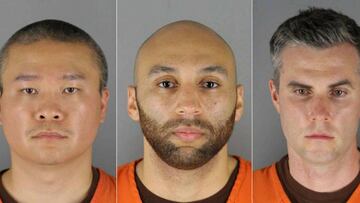George Floyd's death: what charges are other police officers facing?
The charges against Derek Chauvin have been increased to second-degree murder, while the three other officers face charges of aiding and abetting second-degree murder.


The three other officers involved in the killing of George Floyd - J Alexander Kueng, Thomas Lane, and Tou Thao - are each facing charges of aiding and abetting second-degree murder and aiding and abetting second-degree manslaughter. Lane and Kueng helped hold Floyd down while Thao stood watch.
George Floyd, a 46-year-old black man, who was unarmed and already handcuffed, was killed on Monday, 25 May, when police officer Derek Chauvin knelt on his neck for nearly nine minutes, despite Floyd pleading that he could not breath. The death was caught on film by a bystander. The police had been called by a local grocery store that suspected Floyd had tried to use a counterfeit $20 bill to buy cigarettes. The killing has sparked protests across the USA and around the world.
Directly after the killing all four police officers were sacked, but no charges were initially brought, leading to widespread anger. Derek Chauvin was charged on 29 May, four days later, with third-degree murder and manslaughter, but his criminal complaint sheet has now had second-degree murder charges added to it, while keeping the original charges.
The three other officers, Kueng, Lane, and Tou Thao, were taken into custody on Wednesday, with bail set at $1 million.
- Derek Chauvin charged with murder and manslaughter
- What charges are the three other officers facing
- The four police officers: their history
- Where does Trump's 'when the looting starts...' quote come from?
- George Floyd GoFundMe page raises nearly $5 million
- How a suspected counterfeit $20 bill led to protests across the US
- When did #BlackLivesMatter start?
State attorney general Ellison brings new charges against officers
The new charges against Chauvin and the charges against the three other officers come after Minnesota state attorney general, Keith Ellison, took over the case from Hennepin County Attorney Mike Freeman.
Minnesota AG Ellison announces murder charge against Derek Chauvin elevated to second-degree murder and that 3 other former Minneapolis police officers involved in the death of George Floyd are charged with aiding and abetting murder; arrest warrants issued. pic.twitter.com/AwrIHh1mJw
— NBC News (@NBCNews) June 3, 2020
Ellison looked to manage expectations over the criminal cases being brought against the four officers, admitting that they could take months to see through.
He also spoke to the historic problems of prosecuting police officers: ““Let me be honest here, our country has under-prosecuted these matters in Minnesota and throughout the country,” the attorney general said. “We can’t control the past. All we can do is take the case that is in front of us right now and do our good-faith best to bring justice to this situation, and we will.”
George Floyd family seek first-degree murder charges
The lawyer representing Floyd’s family, Benjamin Crump, said in a statement: "This is a significant step forward on the road to justice and we are gratified that this important action was brought before George Floyd's body was laid to rest."
But Crump later told CNN that the family believed the charge against Derek Chauvin should be first-degree murder and that they had been told that the investigation was ongoing and the charges could change further.
Additional charges in George Floyd murder case
Minnesota state attorney general Ellison said in relation to the new charges: “First-degree murder charges in Minnesota require premeditation. Second-degree murder charges involve unintentional killing while committing a felony.”
Ellison made it clear that the second-degree murder charge was being brought on this latter set of facts, and that Chauvin had been committing the felony of an assault on Floyd when he killed him.
What is second-degree murder and how is different to first-degree murder and third-degree murder
Second-degree murder in Minnesota includes killing a human intentionally but without premeditation (not thinking about or preparing for committing the crime beforehand), or causing someone’s death without intending the death of anyone, while committing a felony, the case being brought against Chauvin.
Third-degree murder is being kept on the criminal complaint against Chauvin, and is the causing of someone’s death by placing others in eminent danger of death and disregarding human life. An example would be firing a gun into a crowd without meaning to kill anyone, but the act is so reckless and likely to cause death that a murder charge is warranted.
First-degree murder, the charge sought by Floyd's family, requires the prosecutor to prove three basic elements were present: wilfulness, deliberation and premeditation.
Note that in general the requirement for deliberation and premeditation does not require that the perpetrator must contemplate at length or plan far ahead of the killing. Provided a reasonable person would consider that the decision had been made, that would generally suffice. This can happen very quickly, but cannot take place at the same time as the act of killing.
Penalties for second-degree murder and aiding and abetting second-degree murder
Related stories
In Minnesota second-degree murder is punished with not more than 40 years imprisonment. Third-degree murder is sentenced with up to 25 years.
First-degree murder is punished with up to life in prison. Minnesota does not have the death penalty.
The maximum punishments for aiding and abetting murder are the same as the penalties for the underlying crime, meaning sacked police officers Kueng, Lane, and Thao face up to 40 years in jail if convicted.

